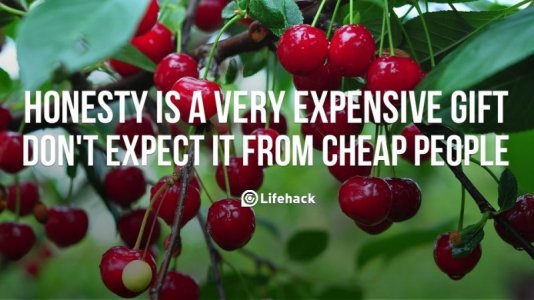grahamg
Old codger
- Location
- South of Manchester, UK
A good friend and I had a discussion yesterday that touched on the subject of honesty and the need for it generally in both the private and public sphere's of life, (she is very honest btw but perhaps rates its importance differently than I do, or at least for arguments sake!):
Here is some research on the topic:
https://hbr.org/1990/09/why-be-honest-if-honesty-doesnt-pay
More here:
https://www.rewriting-the-rules.com...nd-honesty-can-we-have-one-without-the-other/
Quote:
"..........., how, often, when we try to communicate honestly we sacrifice kindness, and when we try to be kind to others we sacrifice honesty. I concluded that it was important to find a balance between the two: holding that tension whenever we communicate with others, or indeed ourselves.
Lately, however, it seems to me that kindness and honesty are more inextricably linked than I previously thought. It struck me that kindness without honesty is not really kindness, and that honesty without kindness is not really honesty. So whether we are somebody who – in life – prides ourselves on our openness and straightforwardness, or on our compassion and generosity, we have to engage seriously with the other aspect in order to be truly as we are aiming to be (honest, or kind, respectively)."
And lastly on the purely personal, (not so sure on their advice though):
https://www.mindbodygreen.com/0-5775/5-Reasons-to-Be-Honest-in-Love.html
“Each lie that your partner catches you in dilutes your bond, turning you from teammates to opponents in an invisible conflict where your word is never taken seriously,” ******* explains. “That being said, no need to be brutal when delivering your opinion or answering questions honestly that you know might hurt.”
For example, if your partner just cooked you the worst meal you’ve ever had in your life and asks you what you think of the food, you should be honest—don’t say you love it when you don’t. But ****** recommends avoiding unnecessarily hurtful statements (i.e. “you're a terrible cook”) and springing for kinder ways to convey the same sentiment: “Hmm. I so appreciate that you made dinner tonight. Does it taste a little bitter to you though?” Or, “It’s a little bitter tasting to me, so I think there’s some room for improvement. But you clearly put a lot of effort into this, and I so appreciate it when you make dinner.”
Here is some research on the topic:
https://hbr.org/1990/09/why-be-honest-if-honesty-doesnt-pay
More here:
https://www.rewriting-the-rules.com...nd-honesty-can-we-have-one-without-the-other/
Quote:
"..........., how, often, when we try to communicate honestly we sacrifice kindness, and when we try to be kind to others we sacrifice honesty. I concluded that it was important to find a balance between the two: holding that tension whenever we communicate with others, or indeed ourselves.
Lately, however, it seems to me that kindness and honesty are more inextricably linked than I previously thought. It struck me that kindness without honesty is not really kindness, and that honesty without kindness is not really honesty. So whether we are somebody who – in life – prides ourselves on our openness and straightforwardness, or on our compassion and generosity, we have to engage seriously with the other aspect in order to be truly as we are aiming to be (honest, or kind, respectively)."
And lastly on the purely personal, (not so sure on their advice though):
https://www.mindbodygreen.com/0-5775/5-Reasons-to-Be-Honest-in-Love.html
Is honesty always the best policy?
Yes, honesty is always necessary in a relationship 100% of the time.“Each lie that your partner catches you in dilutes your bond, turning you from teammates to opponents in an invisible conflict where your word is never taken seriously,” ******* explains. “That being said, no need to be brutal when delivering your opinion or answering questions honestly that you know might hurt.”
For example, if your partner just cooked you the worst meal you’ve ever had in your life and asks you what you think of the food, you should be honest—don’t say you love it when you don’t. But ****** recommends avoiding unnecessarily hurtful statements (i.e. “you're a terrible cook”) and springing for kinder ways to convey the same sentiment: “Hmm. I so appreciate that you made dinner tonight. Does it taste a little bitter to you though?” Or, “It’s a little bitter tasting to me, so I think there’s some room for improvement. But you clearly put a lot of effort into this, and I so appreciate it when you make dinner.”
Last edited:



